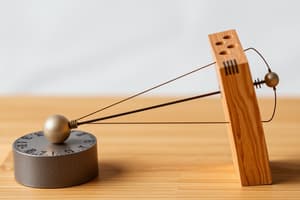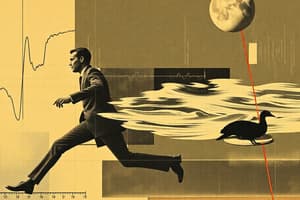Podcast
Questions and Answers
What primary effect does friction have on a moving object?
What primary effect does friction have on a moving object?
- It causes the object to move in a straight line.
- It increases the object's speed.
- It has no effect on the object's motion.
- It causes the object to slow down and eventually stop. (correct)
Which of the following best describes air friction's impact on a falling object?
Which of the following best describes air friction's impact on a falling object?
- It acts against the force of gravity. (correct)
- It decreases the force of gravity acting on the object.
- It doesn't affect the force of gravity acting on the object.
- It increases the rate at which an object falls.
Which type of friction occurs when a wheel rolls across a surface?
Which type of friction occurs when a wheel rolls across a surface?
- Rolling Friction (correct)
- Fluid Friction
- Sliding Friction
- Static Friction
What is the primary cause of sliding friction?
What is the primary cause of sliding friction?
If a boat is sailing in the sea, which kind of friction is primarily acting against its motion?
If a boat is sailing in the sea, which kind of friction is primarily acting against its motion?
What condition is necessary for static friction to occur?
What condition is necessary for static friction to occur?
Which activity demonstrates a desirable effect of friction?
Which activity demonstrates a desirable effect of friction?
Which of the following is NOT a way to reduce friction?
Which of the following is NOT a way to reduce friction?
Which of the following is an example of potential energy?
Which of the following is an example of potential energy?
A stone released by a slingshot is a good example of which type of energy?
A stone released by a slingshot is a good example of which type of energy?
Which simple machine is essentially a double-inclined plane that is sharpened to an end?
Which simple machine is essentially a double-inclined plane that is sharpened to an end?
A wheel and axle is most closely related to which simple machine?
A wheel and axle is most closely related to which simple machine?
Which of the following is NOT an example of a lever?
Which of the following is NOT an example of a lever?
According to the law of conservation of energy, what happens to the total amount of energy in a system?
According to the law of conservation of energy, what happens to the total amount of energy in a system?
What is the primary function of a lever?
What is the primary function of a lever?
What type of energy transformation primarily occurs when a battery-operated clock is working?
What type of energy transformation primarily occurs when a battery-operated clock is working?
When a bicycle slows down after pedaling stops on a flat path, what energy transformation is mainly responsible?
When a bicycle slows down after pedaling stops on a flat path, what energy transformation is mainly responsible?
Which tool or device uses the principle of a screw?
Which tool or device uses the principle of a screw?
Which simple machine is used when using a ramp to move a heavy object?
Which simple machine is used when using a ramp to move a heavy object?
What is the primary energy transformation when plants undergo photosynthesis?
What is the primary energy transformation when plants undergo photosynthesis?
What energy conversion best represents food providing energy for human muscles to work?
What energy conversion best represents food providing energy for human muscles to work?
Which of the following is an example of a first-class lever?
Which of the following is an example of a first-class lever?
A flagpole primarily utilizes which type of simple machine?
A flagpole primarily utilizes which type of simple machine?
During energy transformation, what form of energy is typically produced as a byproduct?
During energy transformation, what form of energy is typically produced as a byproduct?
Which of the following is an example of a simple machine that uses a sloping surface to help reduce the force required to do work?
Which of the following is an example of a simple machine that uses a sloping surface to help reduce the force required to do work?
A baseball bat is classified as which type of lever?
A baseball bat is classified as which type of lever?
What is the main function of a pulley?
What is the main function of a pulley?
When wind turbines move they produce which form of energy that is then converted for human use?
When wind turbines move they produce which form of energy that is then converted for human use?
A boy throws a ball over a fence. Which is the form of energy the moving ball has?
A boy throws a ball over a fence. Which is the form of energy the moving ball has?
Which of these is an example of a compound machine?
Which of these is an example of a compound machine?
Flashcards
Friction
Friction
A force that opposes motion between two surfaces in contact.
Air Friction
Air Friction
Friction that acts on objects moving through air, like a falling leaf or a plane.
Rolling Friction
Rolling Friction
Friction between surfaces that are rolling over each other, like a tire on the road.
Sliding Friction
Sliding Friction
Signup and view all the flashcards
Fluid Friction
Fluid Friction
Signup and view all the flashcards
Static Friction
Static Friction
Signup and view all the flashcards
Potential Energy
Potential Energy
Signup and view all the flashcards
Kinetic Energy
Kinetic Energy
Signup and view all the flashcards
Chemical Energy
Chemical Energy
Signup and view all the flashcards
Gravity
Gravity
Signup and view all the flashcards
Energy Transformation
Energy Transformation
Signup and view all the flashcards
Law of Conservation of Energy
Law of Conservation of Energy
Signup and view all the flashcards
Heat Energy
Heat Energy
Signup and view all the flashcards
Light Energy
Light Energy
Signup and view all the flashcards
Sound Energy
Sound Energy
Signup and view all the flashcards
Simple Machine
Simple Machine
Signup and view all the flashcards
Compound Machine
Compound Machine
Signup and view all the flashcards
Inclined Plane
Inclined Plane
Signup and view all the flashcards
Lever
Lever
Signup and view all the flashcards
Wedge
Wedge
Signup and view all the flashcards
Screw
Screw
Signup and view all the flashcards
Pulley
Pulley
Signup and view all the flashcards
Wheel and Axle
Wheel and Axle
Signup and view all the flashcards
First class lever
First class lever
Signup and view all the flashcards
Second class lever
Second class lever
Signup and view all the flashcards
Third class lever
Third class lever
Signup and view all the flashcards
Pulley System
Pulley System
Signup and view all the flashcards
Study Notes
Friction
- Friction opposes motion, causing objects to slow down and stop.
- It's a force that resists the sliding movement of surfaces in contact.
- Surfaces sticking or touching together create friction.
- Air friction acts against gravity, affecting falling objects.
- Examples include friction between tires and roads, objects and surfaces, and falling objects.
Kinds of Friction
- Rolling Friction: Occurs when an object rolls on a surface. Examples include moving vehicle tires on the road.
- Sliding Friction: Also known as dry friction, arises when two objects slide against each other. Examples include moving a block of wood on sandpaper or pushing an object.
- Fluid Friction: Occurs between moving objects and a fluid (liquid or gas). Examples include a swimmer in water, a boat traveling in water, and an airplane.
- Static Friction: A type of friction that prevents stationary objects from moving. Examples include a notebook on a table.
Effects of Friction
- Desirable Effects: Friction allows gripping, converting motion types (e.g., one form of motion to another), and converting energy from one form to another.
- Undesirable Effects: Friction creates heat, noise, and causes wear and tear on materials, making objects more difficult to move at a constant speed.
Ways to Overcome or Reduce Friction
- Using lubricants on surfaces
- Reducing contact between moving surfaces
- Minimizing contact between rough surfaces
- Using aerodynamic shapes
Energy
- Potential Energy: Stored energy related to position. Examples include a ball held above the ground, a stretched rubber band, or a boulder on a hill. - Forms of potential energy include: Chemical, Elastic, Nuclear, Gravitational
- Kinetic Energy: Energy of motion. Examples include a stone released by a slingshot, a rolling ball, and a moving object.
-Forms of kinetic energy include: Radiant/Light, Sound, Thermal/Heat, Electrical, Mechanical - Energy cannot be created or destroyed, only transformed.
Simple Machines
- Inclined Plane: A sloping surface that reduces the effort needed to lift an object. Examples include ramps, slopes.
- Lever: A rigid bar that pivots around a fixed point (fulcrum). Examples include crowbars, oars, nutcrackers. -Three types of levers: First-class (fulcrum between load and effort), Second-class (load between fulcrum and effort), and Third-class (effort between load and fulcrum)
- Wedge: A double inclined plane that is sharpened at both ends. Examples include axe blades.
- Screw: An inclined plane wrapped around a cylinder. Examples include screws.
- Pulley: A grooved wheel with a rope or cable running through it to change the direction or magnitude of a force. Examples include bicycle gears.
- Wheel and Axle: A wheel with a smaller axle attached. Examples include bicycle gears, door knobs, and bottle openers.
Studying That Suits You
Use AI to generate personalized quizzes and flashcards to suit your learning preferences.




